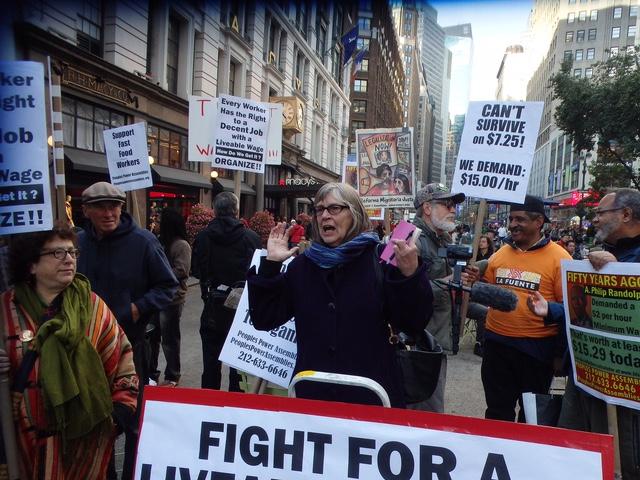Waging against the wage
While America begins to fall into a recession in 2013, NYC protesters rally for a higher minimum wage. This fight for low wage workers is slowly starting to get more and more attention as ballot initiatives reinforce direct voting.
November 7, 2016
Politics; you either love to talk about it, or you hate it. With the the election right around the corner, the stir of platforms and economic strategies cannot be avoided. The concept of minimum wage has been an ongoing conflict for countries all over. This Tuesday, Arizona, Colorado, Maine, and Washington will have a ballot initiative to raise the minimum wage between 43 and 60 percent. If this action is completed, Washington wishes to raise their minimum wage from $9.47 to $13.50 by 2020; the city of Seattle has already approved a $15 minimum wage, though the other three states hope to accomplish a $12 minimum wage by the same year.
The United States is a democratic republic, or in other words, a country where power is rested in the hands of the people, but the government itself is run through elected officials. However, it is fair to say that our country is more of a republic than a democracy. This limits the direct power of citizens; instead of voting for a legislature to take place, people vote for a representative who says they will enact a legislature. In turn, the idea of ballot initiatives derives from giving the people a better way to directly enact a law. Executive director of The Fairness Project, a campaign to raise the minimum wage, believes that ballot initiatives allow voters to take action when politicians have failed. Since 2000, fifteen states have had higher minimum wage on ballot initiatives, and all of them have passed. The states of Colorado and Washington both lean left, and therefore will be more prone to have their ballots completed and approved. Arizona and parts of Maine, however, will be more of a struggle since demographically, they lean more toward the right.
There is a good chance that as states raise their minimum wage others will follow, and the federal government may even raise it nationally from its current $7.25. Civics and Economics teacher Coach East has his own opinion on what raising the minimum wage would mean for Americans: “I think there should be a national minimum wage, but it should be adjusted depending on which part of the country you live and the cost of living. For example, the minimum wage in NC should not be the same as in NY.” Unfortunately, like most other economic circumstances, raising the minimum wage has its cons. Many people, for instance, argue that an increased minimum wage would hurt most small businesses and could also cause businesses to hire less or even close down. The price of consumer goods would also raise, since the value would need to be increased as workers are paid more. On the other hand, spiking up the minimum wage would increase economic activity and reduce government welfare spending. In addition, a raise would also ensure that low wage workers could adapt to the standard of living of the current economy.
Seeing that money is a manmade concept and the more that is produced, the less value it has, it can be very difficult and risky to proceed down a path that could disrupt the economic flow of our country. However, state and federal governments are continuing to fight to end poverty and bring our economy up. There will always be people against the idea, but a good fraction of the country is slowly starting to realize the action that needs to be taken. Whether we agree or disagree about raising the minimum wage, we all want one thing: a better economy.













